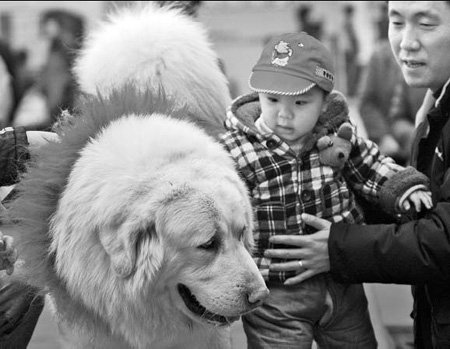Tibetan mastiff is top dog
China's latest must-have luxury for the ultra-rich, to go with mansions and sports cars, is a large, slobbery dog with massive amounts of hair and best known for herding sheep in the Tibet autonomous region.
 |
|
A 1.8-meter-long and 100-kg purebred Tibetan mastiff receives attention at a mastiff show in Chongqing on March 7. A real estate developer offered 8 million yuan ($1.17 million) to buy the dog, but the owner turned down the offer. |
Although it is a controversial issue, pet ownership is booming in China and the Tibetan mastiff is the dog of the moment for those who want to spread their wealth beyond stocks and real estate property.
"I used to invest in German shepherds, but Tibetan mastiffs are what's hot right now," said Sui Huizheng, a business owner who has about 20 of the dogs and attended the 6th annual China Tibetan Mastiff Expo last weekend.
Hundreds of the dogs were on hand, as owners and handlers marched the most expensive ones down catwalks as though they were fashion models. Some carried the names of wealthy Americans like "Warren Buffett", while others were called "God" and "Prince".
Among the owners was a controversial running coach who trained world track champions in the 1980s.
Breeders are willing to pay tens of thousands of dollars for a mate for their mastiff. Sui spent $43,000 for a large platform and a poster-plastered booth to show off his dogs. One breeding session with Sui's top mastiff King goes for $40,000.
The craze seems to defy sales patterns and common sense elsewhere, especially for a dog that is common, has thick, lion-mane-like hair, grows to 180 pounds (80 kilograms) and is known for being fierce.
"I can understand racehorses and diamonds, but I don't understand why someone would want to pay half a million dollars for a dog," said Martha Feltenstein, president of the American Tibetan Mastiff Association. "They have a relatively short life expectancy and are not especially rare, so it's quite puzzling why they are fetching such a high price in China."
In the United States, Tibetan mastiff pups can be bought for as little as several hundred dollars, Feltenstein said.
Breeders in China say adult Tibetan mastiffs sell for tens of thousands of dollars, and can even go for more than $100,000.
One of them sold for more than half a million dollars last year to a woman in northern China who then sent 30 black Mercedes-Benz and other luxury cars to fetch the dog from the airport.
After splurging on real estate in Australia, American thoroughbreds and European designer fashions, China's rich see the Tibetan mastiffs as a new status symbol.
China is now home to an estimated 825,000 millionaires, the most in modern history, and its luxury goods market is one of the fastest growing in the world. Among the must-haves for rich men in Northeast China, Xinhua News Agency recently reported, was a young beautiful wife, a Lamborghini and a Tibetan mastiff, "the bigger and more ferocious the better".
"You could call it a local luxury brand," said Rupert Hoogewerf, a Shanghai-based tax specialist who compiles a popular annual list of China's richest people.
"Luxury brands are growing at phenomenal rates in China and owning a Tibetan mastiff is another channel for increasing your credibility and showing off your rich status."
The mastiffs themselves look like money and resemble a lion, which is a traditional symbol of good fortune.
Potential profits from mastiff breeding are what drew Sui, the businessman-breeder, who said he isn't a dog lover.
 0
0 







Go to Forum >>0 Comments